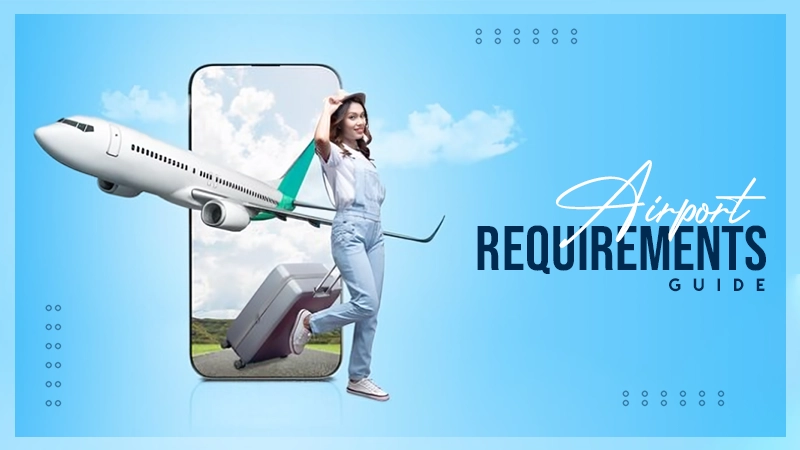
A majority of new travelers experience a mix of excitement and the low-grade anxiety of airport logistics. The journey from the front door to the airplane gate includes various checks and restrictions that can instantly turn a dream vacation into a frustrating setback.
From the moment you book a ticket, your focus must shift beyond this chaos of paperwork and luggage. The world’s highly specific and rapidly changing travel requirements result in heavy transportation fines.
But knowing the potential issues are all associated with the necessary airport requirements, you just need to know how to manage all these things.
Are you also looking forward to your first trip? Don’t worry, here I have simplified the essential documents, health requirements, and logistical tips you need to master for a seamless trip.
KEY TAKEAWAYS
- Missing, damaged, or expired travel documents are the primary cause of being turned back.
- Always verify current health mandates for your destination and any transit countries.
- Airlines and travelers rely on the IATA Timatic database for the most current and accurate information.
- Stick to a flight’s luggage restrictions to avoid unexpected fees.
Documentation and Why it Matters
It is important to appreciate the high number of passengers returning to their destination and transit points every year. Airlines can face return charges, fines and penalties for carrying passengers that are not permitted.
It should also be noted that health, visa, and immigration rules can change rapidly. Because of the risks involved, airlines and passengers utilize recognized systems like IATA’s Timatic. With this, it is easier to verify all sorts of travel requirements. The most essential documents you need to have include:
Visa, passport, and national ID
A passport stands as the core travel document for international flights. However, there are others. Depending on the country, you may have to deal with some additional rules regarding the expiration and strength. In some cases, a visa or entry authorization may be needed. You need to check:
- The validity period: There is a requirement in many countries that a passport should be valid for a minimum of six months beyond your arrival date. As a rule of thumb, always get conversant with the destination requirements while planning your journey. This may be longer, shorter, or waived altogether in some cases.
- Travel authorizations, eTA, and Visas: Typically, this is based on your nationality and destination. You may need an e-visa or a traditional one in advance. There are countries that have installed an electronic travel authorization system already.
- Secondary ID or national ID: In contexts such as backup identification or domestic flights, a driver’s license or your national ID may suffice. Having multiple IDs where possible is prudent.
- Condition of your passport: Torn, water-stained, or damaged documents are highly likely to be rejected. “Good condition” is an explicit requirement in most places.
- Other travel document or multiple passports: Frequent travelers or dual nationals may hold more than one passport. If you fall into this category, you should ensure that you have clear photocopies or digital scans of all required documents. This is especially useful in case you lose material things.
Vaccination/Health and COVID Requirements
Over the recent years, health documentation has become quite important. Even with some countries loosening the initial pandemic restrictions, they remain in place in others. Evaluate the need for:
- Yellow fever certificate or other mandates: There are countries that require vaccination proof before you can gain entry. This is most especially applicable to those coming from or entering high-risk zones.
- COVID-19 tests, vaccination, or proof of recovery: These are still required in some cases. Such rules may be reinstated or modified without notice.
- PLFs or passenger locator forms: Governments may require travelers to fill in locator forms before traveling. This is most often completed online. A reference number or a QR code is sometimes generated to be presented at check-in and to immigration as needed.
- Timatic integration: The IATA Timatic database clearly lays down health and vaccination rules. This is normally updated through the airline and government contacts to uphold accuracy. It is important to verify all requirements for any connecting countries and destinations you plan to visit.
- Proof of return or onward travel: It is important to have your flight ticket(s) at hand. There are airlines or countries that may need you to show that you don’t intend to overstay your visit. A one-way ticket may be a sticking point. Even though this requirement isn’t enforced by every country, there are those that do so during check-in or visa issuance. It should be noted that airline and immigration policies are not uniform. Therefore, take time to check with all relevant bodies.
Parking
If you intend to leave your vehicle at or near the airport, there are various parking regulations and options. Requirements cover things like parking duration, with multiple parking products available.
Some of the best providers have modern systems in place like license plate recognition technology. This ensures your vehicle is safe throughout. Remember that it is cheaper to book airport parking near the airport at the private car parks – the official airport parking facility at Tullamarine is very costly. You can reserve your spot now for your next trip.
Luggage restrictions
Depending on how long you are traveling, you may need a suitcase, hand luggage or both. There are often strict size and weight restrictions listed on airport websites. You may have to face heavy charges if you exceed the prescribed limit. It is better to pack and check your weight before you go to the airport. Your baggage must go through security and have its contents inspected before boarding.
The travel doors should be open, not closed due to paperwork. Whether your trip is regional or crossing continents, you should make adequate preparations to ensure that things go according to plan. Gather all the correct documentation, stay in touch with current requirements, stay within the weight limits and keep all health certifications up to date.
Why are airlines so strict about checking my travel documents?
Airlines and governments face significant costs, fines, and penalties for carrying passengers who are ultimately denied entry to their destination.
What is the general validity rule for my passport for international travel?
As a standard practice, many countries require your passport to be valid for at least six months from the date of arrival.
What should I do if my passport is slightly damaged, such as with water stains or tears?
Damaged documents have a high chance of being rejected. It is a good idea to replace any torn, water-stained, or damaged passports before traveling internationally.
In addition to my passport and visa, what other documents may I need?
This may include a yellow fever certificate, a COVID-19 vaccination/testing/reimbursement certificate, and sometimes a government-mandated travel applicant form.










